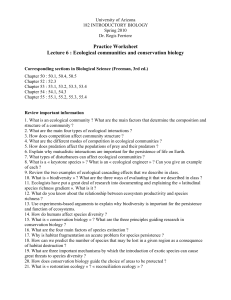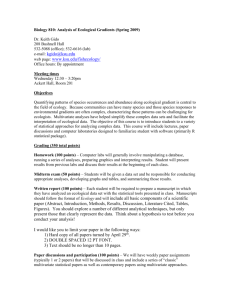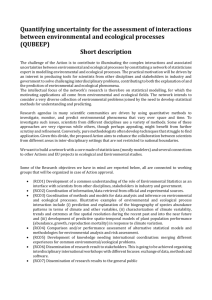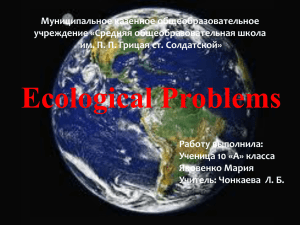Who Should Attend - Kawanda Agri
advertisement
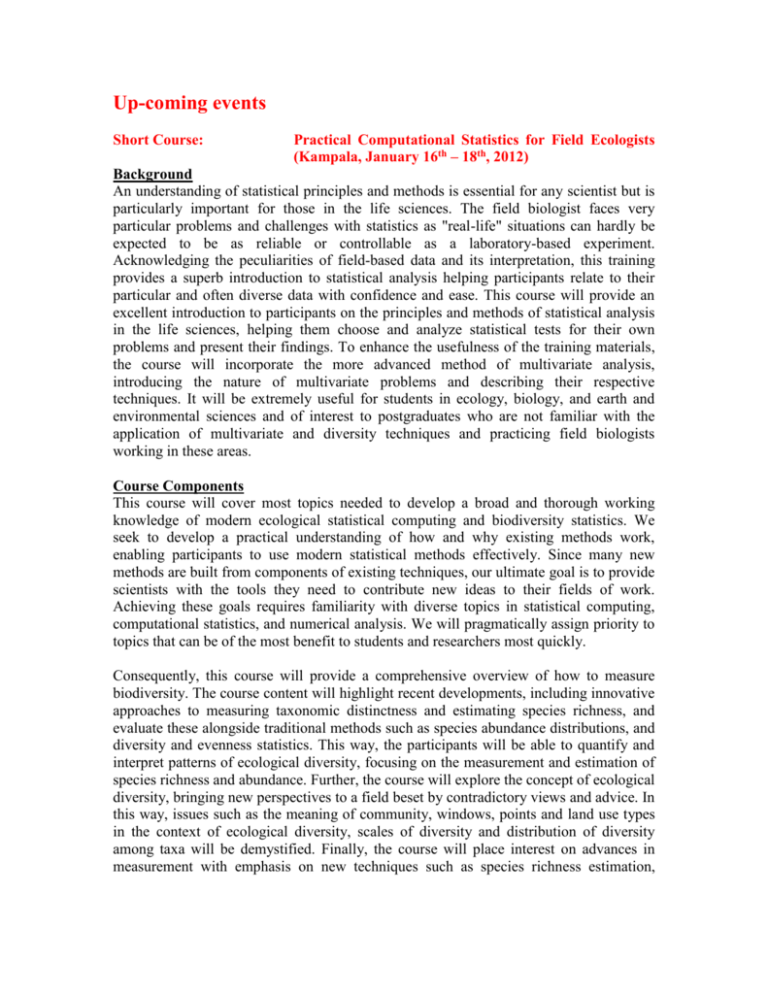
Up-coming events Short Course: Practical Computational Statistics for Field Ecologists (Kampala, January 16th – 18th, 2012) Background An understanding of statistical principles and methods is essential for any scientist but is particularly important for those in the life sciences. The field biologist faces very particular problems and challenges with statistics as "real-life" situations can hardly be expected to be as reliable or controllable as a laboratory-based experiment. Acknowledging the peculiarities of field-based data and its interpretation, this training provides a superb introduction to statistical analysis helping participants relate to their particular and often diverse data with confidence and ease. This course will provide an excellent introduction to participants on the principles and methods of statistical analysis in the life sciences, helping them choose and analyze statistical tests for their own problems and present their findings. To enhance the usefulness of the training materials, the course will incorporate the more advanced method of multivariate analysis, introducing the nature of multivariate problems and describing their respective techniques. It will be extremely useful for students in ecology, biology, and earth and environmental sciences and of interest to postgraduates who are not familiar with the application of multivariate and diversity techniques and practicing field biologists working in these areas. Course Components This course will cover most topics needed to develop a broad and thorough working knowledge of modern ecological statistical computing and biodiversity statistics. We seek to develop a practical understanding of how and why existing methods work, enabling participants to use modern statistical methods effectively. Since many new methods are built from components of existing techniques, our ultimate goal is to provide scientists with the tools they need to contribute new ideas to their fields of work. Achieving these goals requires familiarity with diverse topics in statistical computing, computational statistics, and numerical analysis. We will pragmatically assign priority to topics that can be of the most benefit to students and researchers most quickly. Consequently, this course will provide a comprehensive overview of how to measure biodiversity. The course content will highlight recent developments, including innovative approaches to measuring taxonomic distinctness and estimating species richness, and evaluate these alongside traditional methods such as species abundance distributions, and diversity and evenness statistics. This way, the participants will be able to quantify and interpret patterns of ecological diversity, focusing on the measurement and estimation of species richness and abundance. Further, the course will explore the concept of ecological diversity, bringing new perspectives to a field beset by contradictory views and advice. In this way, issues such as the meaning of community, windows, points and land use types in the context of ecological diversity, scales of diversity and distribution of diversity among taxa will be demystified. Finally, the course will place interest on advances in measurement with emphasis on new techniques such as species richness estimation, application of measures of diversity to conservation and environmental management and addressing sampling issues. Software to be Covered 1. ade4: This is software developed in the Biometry and Evolutionary Biology Laboratory - University Lyon. It contains Data Analysis functions to analyse Ecological and Environmental data in the framework of Euclidean Exploratory methods, hence the name ade4. 2. BiodiversityR: This package provides a GUI (Graphical User Interface, via the RCommander) and some utility functions (often based on the vegan package) for statistical analysis of biodiversity and ecological communities, including species accumulation curves, diversity indices, Renyi profiles, GLMs for analysis of species abundance and presence-absence, distance matrices, Mantel tests, and cluster, constrained and unconstrained ordination analysis. 3. PAST is an easy-to-use data analysis package originally aimed at paleontology but now also popular in many other fields. It includes features for computing all diversity and similarity indices, statistical, plotting and modelling functions. Course Fee: One Hundred Thousand (100,000=) Ugandan Shillings (Course fee includes the instruction fee, three software packages, meals and Certification. The course fee for non Ugandans is US$ 100. Start and location The course starts on January 16th and ends on 18th, 2012. The course will be held at the National Banana Resources Centre at the National Agricultural Research Laboratories (formerly Kawanda Agriculture Research Institute). Precise details will be sent on confirmation of your booking. Who Should Attend This course is designed for under and post graduate students, researchers, managers, lecturers, and decision makers. Merit Award At the end of the course, successful participants will be awarded a “Certificate in Ecological Computational Statistics”. To Book Your Place Please complete the registration form and email it to brianisabirye@yahoo.com. Once this is received, your place will be confirmed on the course. For details about the course, Please contact the Course Coordinator: Brian E. Isabirye (brianisabirye@yahoo.com or +256772352739)



